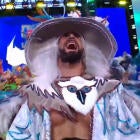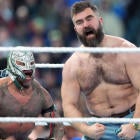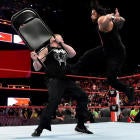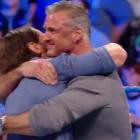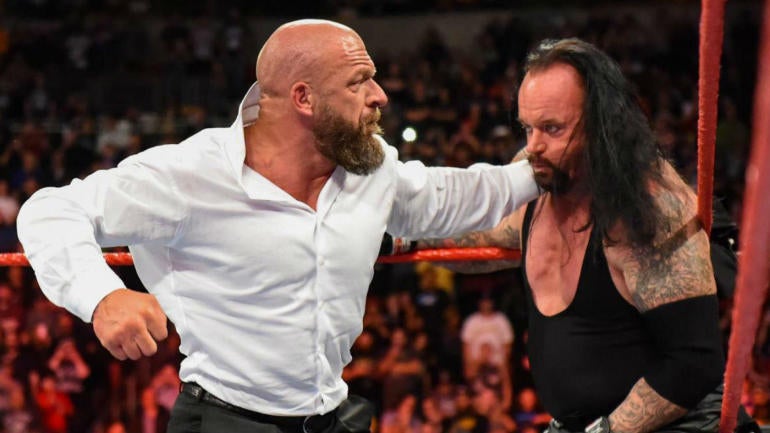
Over the course of nearly 25 years, The Undertaker and Paul "Triple H" Levesque have created one of the most iconic pairings in WWE history. Matches between the two men date back to competing on opposing sides of a Survivor Series match in 1995 and have continued through epic WrestleMania encounters and a disappointing 2018 tag team match in Saudi Arabia.
That history, and the mutual respect that's developed between the two, is one of the central themes in the third episode of "Undertaker: The Last Ride," which premieres Sunday at 10 a.m. ET on WWE Network.
Speaking with CBS Sports, Levesque discussed the manner in which approaching matches with The Undertaker changed over the years, evolving from a focus on earning respect to purely fun to, ultimately, taking on the difficult task of two aging performers trying preserve the magic they once shared.
"Obviously, everybody changes as performers and who you are," Levesque said. "When I first came in here and faced him for the first time in 1995, it was just about earning his respect and trust as a performer. Taker is one of those guys who gives everybody respect, but you don't just get it, you have to earn it. That's in-ring and everything else. I approached that time very differently. Over the course of our careers, we worked a lot. At that point in time, you just didn't think about it. It was a night off. If I was wrestling Taker -- and I'd like to think he thought the same with me -- it was a night off. You don't have to think about it -- he's going to do his part, you don't have to think for him. You just go in there and it's magic and fun. You're laughing and having a good time because you're in there with a guy that's incredibly gifted in the ring but you also get along with and think the same as. It couldn't be any easier.
"But, when you fast forward toward the end of your careers and he's in the place he's in with everything you're seeing in 'The Last Ride,' with self-doubt and the physical shape that he was in and trying to overcome all that, and then you're having your own issues with all of that. As you've heard him say, and I've said it a bunch, the hardest thing I've ever done is have to do what we do and try to do it at the level we want to do it at once or twice a year. It's incredibly difficult. So, the approach to that in 2018 is a completely different animal. You don't know what he's going to bring to the table, and in some way, you doubt what you can bring to the table. That makes it a lot more difficult."
The final match to date between Undertaker and Triple H proved just how difficult that can truly be. Teaming with Kane and Shawn Michaels, respectively, The Undertaker and Triple H took part in a tag team match in Saudi Arabia that not only disappointed fans but left the performers frustrated. That tag match came one month after an equally disappointing singles match between Triple H and The Undertaker at 2018's Super ShowDown in Australia.
That two-match stretch could not be more different compared to the two previous meetings. At WrestleMania 27 and 28, Triple H and The Undertaker put on matches that rank for many among the best in the history of WWE's annual extravaganza. There was a lot to live up to for both men heading into those matches, especially after The Undertaker and Shawn Michaels had put on a pair of epic matches at the previous two WrestleMania events. That pressure was felt, Levesque said, but failed to pose a problem in 2011 and 2012.
"There's incredible pressure," Levesque admitted. "At the same point in time, you have to look at it and know I'm a different performer than Shawn is. I mean that in every possible way. He's one of, if not the greatest of all time, certainly one of. He's just a different level of performer. There's only one Shawn, just like there's only one Taker. He and I are going to have a different match than he and Shawn would have. At the same time, you want it to be of the same caliber and the same everything else. You don't want it to fall apart for Taker or for yourself. But, for us, that's a ton of pressure, but at that point in time we were both in a place where we both thrived on that pressure and loved it. And we were still at a place where ... no doubt. You don't have that doubt and you feel like, 'Here we go.'
"Fast forward after that, every year it gets harder and harder. I remember having these conversations with Taker after those matches going into the year following that, with him just saying, 'Man, I don't see anything there that can do what these four matches did and I don't know if I should just be done.' I remember the first time he said it to me I was shocked. He had brought up getting to the end and all that stuff numerous times. A lot of people do, but it's just talk. The further down the line you get, the more weight those conversations carry. I think that became the struggle for him. How do you live up to that legacy he felt he had created for himself in those last four years. The truth is, it's a whole career worth of work. But that is the pressure you put on yourself. Every year that goes by, you put more pressure on and have less tools to deliver on that pressure."
As time began to catch up with The Undertaker and talk of retiring from in-ring competition ramped up, it became more and more difficult for him to continue operating at the level he expected from himself.
After leaving his hat and jacket in the ring following the main-event match with Roman Reigns at WrestleMania 33 in 2017, it seemed The Undertaker had decided to move on to the next phase of his life. But the match had disappointed, and The Undertaker couldn't see his career ending on that note. That led to the postponement of Undertaker's retirement and kicked off a cycle of redemption attempts in pursuit of the ideal career-ending performance, only to then decide there was more in the tank -- and more disappointments -- which included the aforementioned 2018 matches with Triple H.
"It's an addiction," Levesque explained of the difficulties for a wrestler like The Undertaker to retire. "The crowd, the thrill of it, there's nothing like it. To stand in that ring and have those emotions in your hand -- that feeling is incredible. It's the greatest form of entertainment when it's done well. Think of it this way: What other sport or anything else can bring 100,000 into a stadium where you're not focused on everything but the fans? If you go in to play the Super Bowl, you're thinking about the game. You're almost trying to shut out the fan experience and concentrate on the game. Don't let the bigness, the epicness of it, the moment of it get to you. You just want to focus on the game. If you're a fighter and you're fighting in a stadium and it's sold out, your focus is on the other fighter. You can't focus on the crowd and take your mind off the game.
"In our business, it's the exact opposite. It's those fans and that moment. That's what you're trying to get out of them and you're so in tune with those reactions. When you're really good at this and have done it for a long time, their reaction is like your heartbeat. It's the most exciting, intoxicating thing that there is. To put that down is really difficult. I don't like saying this because it sounds shallow, but it's almost everything that you are.
"So, it's tough and a catch-22. If you go in there and don't feel like you had the performance you want, 'Oh man, I can't leave it that way.' If you go in there and you tear it up and it was great, 'I can do that again. I still got it and can continue to do this. That wasn't so bad. I got more.' It's tough. When the feeling is good, you want to do it again and you keep doing it. When it's bad, you can't leave it that way because you have to end on a good note. I hear people say, and I've heard Taker say, it's chasing the dragon. You're always going to chase the dragon."
With The Undertaker "chasing the dragon" and looking for the perfect moment to retire, there are questions surrounding if and when someone in the front office sits him down and takes the decision out of his hands.
In his role as executive vice president of global talent strategy and development, Levesque said that conversation may need to happen at some point. But the only way a retirement could ever stick would be for a performer to make that decision for himself.
"Look, if we have to, we've said it to others," Levesque said. "Somebody has to hold the reins and guide the horse or it'll run itself into the ground. But it's a tough thing. It's hard to tell somebody, 'No, you can't do this.' With all due respect to him, Vince tried to do it with Flair and gave him the greatest moment of all time because it was there. The greatest sendoff, the perfect match with Shawn, the perfect moments, all of that. Nobody in sports has had a moment like that, I don't believe, anywhere in time. Just perfect. And he still left the company and went and had matches for other places. Small, insignificant, way far beneath him. People say, 'Oh, he needed the money.' No he didn't. That was all ego. It's tough.
"In some ways, we can say, you can't do this for us. Look, I've had to have that conversation with talent to say, 'Look, it's over. Medically, we can no longer have you perform here.' The second you say that, the question that is asked is, 'You say I can't do it here but, I mean, I can go somewhere else and do this, right?' It's always that, so it's tough.
"The truth is, he has to be the one that says, 'I'm not doing this anymore.' Even if we tell him he's done, if we want to be realistic about it, he could go do it somewhere else, I suppose. It has to be him. It has to be done right in his mind."















